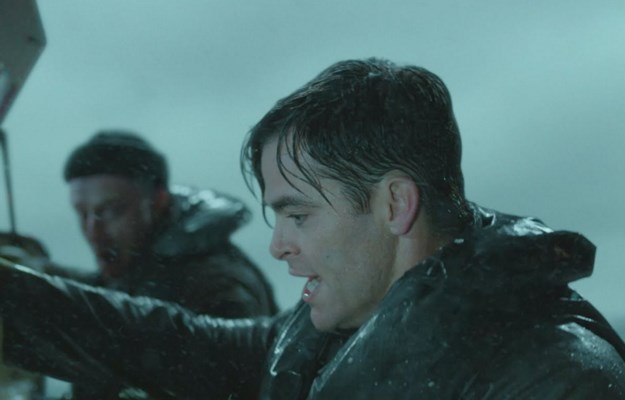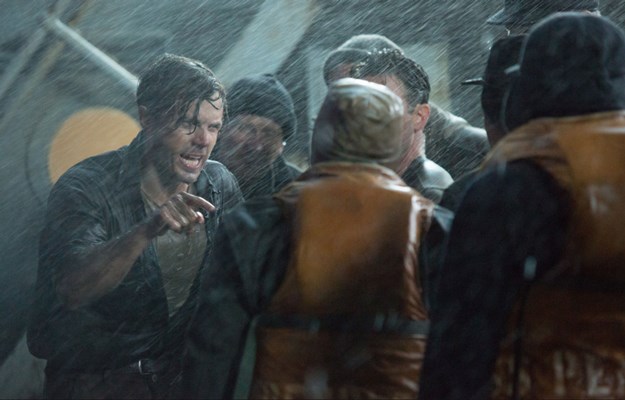
Top stories






More news














Transporting you to the heart of the action and creating a fully immersive cinematic experience on an epic scale, the film is directed by Australian filmmaker Craig Gillespie (Lars and the Real Girl and the highly acclaimed Showtime series The United States of Tara), and written by Scott Silver and Paul Tamasy & Eric Johnson, based on the acclaimed non-fiction book of the same name by Casey Sherman and Michael J Tougias
On 18 February, 1952, a massive nor'easter struck New England, pummeling towns along the Eastern Seaboard and wreaking havoc on anything caught in its destructive path, including two 500-foot oil tankers.
The SS Pendleton and the SS Fort Mercer, bound for Boston, Massachusetts and Portland, Maine, respectively, were both ripped in half by the storm, stranding their crews at sea.
The senior officer aboard the stern of the Pendleton, Chief Engineer Raymond Sybert (Casey Affleck), soon realises it is up to him to take charge of the frightened crew and keep the ship afloat as long as possible.

The Coast Guard station in Chatham, Massachusetts was busy helping local fishermen protect their boats from the storm when they received word that the Fort Mercer was in trouble and orders Coxswain Bernie Webber (Chris Pine) to quickly assemble a crew and take out the CG36500 lifeboat to look for survivors.
Webber and three men board the 36-foot motorised, wooden boat and set off on the perilous mission with bleak prospects, at best, and despite hurricane-force winds, 60-foot waves, frigid temperatures and zero visibility, miraculously locate the Pendleton and rescue 32 of its 33 men in the midst of the turbulent storm.
While The Finest Hours is packed with thrilling, larger-than-life action sequences, it is anchored by the prevailing theme that resonates throughout the story: the strength of the human spirit. "These young men knew exactly what they were getting into when they climbed into that tiny lifeboat," says producer Dorothy Aufiero (The Fighter, Session 9). "They had the courage to go out there and put others' safety first and do something incredible, and I find that truly inspirational."
When the Boston-based filmmaker first read The Finest Hours, the book by Casey Sherman and Michael J Tougias that documented the incredible tale of the Coast Guard's attempts to rescue survivors from two T2 oil tankers, she was shocked she had never heard about it before. While the SS Pendleton rescue was front-page news at the time, not everyone today is familiar with the story, including families of the men who were part of the rescue itself. "These guys just didn't talk about it because to them, it was their job," she explains.
Aufiero brought the project to producer Jim Whitaker (Cinderella Man, The Odd Life of Timothy Green), who felt an immediate connection to the story.
"I was born in Maryland but moved to Nova Scotia when I was 12 and my family lived in an eastern maritime town similar to Chatham, so I related to the story on a personal level," he says. "I knew about the Coast Guard and about the lives of people who made their living on the water and always knew I wanted to tell a story about the people that I grew up with."

They agreed that recreating the gallant efforts of these young men on the big screen was the perfect way to immortalise their story and put together a story treatment and sizzle reel incorporating vintage photos and archival footage of the actual events, which they brought to Disney.
Oscar nominees Scott Silver (8 Mile) and Paul Tamasy and Eric Johnson (The Fighter) completed a screenplay based on Sherman and Tougias' book.
While the book tells the story of both tankers that split that fateful night, the screenplay focusses primarily on the Pendleton rescue and its two stories: the men on the tanker trying to survive on the outside chance that someone might come to find them, and the four young men who set out to rescue them.
Like Aufiero, Craig Gillespie was unfamiliar with the story when first sent the script, but he read it immediately, followed by the book, and was soon on board to direct.
"I really enjoyed how very true the writers stayed to the events and the timeline of when things occurred, which is almost unfathomable considering all that was going on out there in the ocean," he says.
"Yes, it's the story of the greatest small-boat rescue in Coast Guard history, but it also has all these great characters who really were unsung heroes. There was a sense of purity to that generation of men in that they often put others before themselves, and that's what makes them so heroic."
"Craig was absolutely the perfect guy to direct this film," says Whitaker. "The movie is ultimately about a bunch of men going through this very difficult thing, but it's also about their humanity and the emotionality of their actions, and Craig is particularly good at finding those emotional moments and drawing them out in this beautifully subtle way."
The Finest Hours celebrates man's will as his greatest weapon. These young men with different levels of experience, or lack thereof, conquer their own fears and face some of the most destructive forces of nature imaginable to accomplish the impossible. "It's a very simple story about these guys who have jobs to do. It wasn't done for glory and there wasn't a self-aggrandising vibe to it: it was just men doing their job," says Chris Pine. "There are no monsters, it's just men against the ocean, and I think there's something really exciting about seeing men and Mother Nature go at it because Mother Nature doesn't care who you are or where you come from - she just does her thing."
"It's an amazing story," says director Craig Gillespie, "and while there are a lot of thrills and the scale is huge, in the end it's a very personal story."
Adds Casey Affleck, "It's a real story about real people and what they are capable of doing, and how saving their own lives and the lives of others helps them to understand and appreciate their own strengths."
The only surviving member of the rescue crew, Fitzgerald, was engaged by the producers in the early stages of development, as was Gouthro, to help ensure the facts and details were authentic.
"When the script was being written and it came to certain scenes where we needed specific details on what really happened, we had the ability to call and ask Andy," says Whitaker. "This film is at its best when it is celebrating its authenticity, and we really tried to have everything be as real as possible."
On 10 November, 2014, both men visited the set to meet with the cast and crew and answer questions about their experience with the Coast Guard and observed filming of the scene where the Pendleton survivors descend the ladder into the lifeboat. "I was very impressed with the ship that they built," says Gouthro. "Andy and I couldn't believe how much it resembled the real Pendleton."
"It was amazing for Andy and Gus to see us bringing their story to life," remembers Aufiero. "Everyone on set knew they were in the presence of true heroes."
"Some people still look at the Pendleton rescue as a suicide mission, but I never saw it like that," says Fitzgerald, who is now 84 and lives with his wife in Colorado.
"Like we used to say back then, 'You have to go out, but you don't have to come back.' Our job was to save people and that's what we did."
Gouthro is 83 and lives in Wrentham, Massachusetts.
"When people ask me about the Pendleton what I try to impress on them is that it really was no big deal to these guys," he says. "Those four men went out and did their job. They didn't like it - it's not like they were having a good time out on that lifeboat, but it's what they were told to do so they went out and did it."
The production filmed at the Coast Guard station in Chatham where Daniel Cluff gave Webber the questionable assignment more than 60 years ago, which was especially poignant for the cast and crew. "There's this great photo of Bernie and his men sitting at a table in the mess at the station that was taken that night after their return, and we filmed in that actual spot," says Chris Pine. "It was a very profound experience."
The production shot on the docks at Chatham's Stage Harbor (which filled in for the Chatham Fish Pier as it looks nothing like it did in 1952) and at sea where the actual rescue took place.
It was also at the shipyards where a massive water tank holding 800,000 gallons of water was built. The tank, which measured 80 feet by 110 feet and was used to film scenes of the lifeboat's voyage out to sea and the subsequent rescue of the Pendleton's survivors, gave the production the ability to start and stop the waves, wind, rain and snow on command. "You would never be able to film in the ocean in a real squall - that would be absolutely impossible," says Ross. "You have to be able to control the elements."
"We wanted to create the most realistic environment possible for our actors, so we did a combination of exterior shoots at some of the actual locations and some in the water tanks on our stages too," says Whitaker. "Approximately 70% of our water scenes were shot in the tanks, but the rest was in open water."
